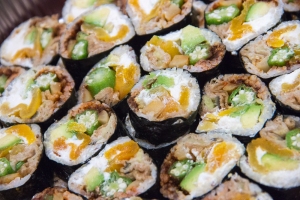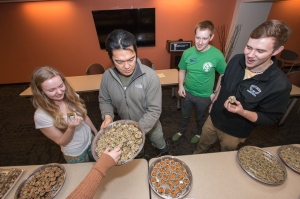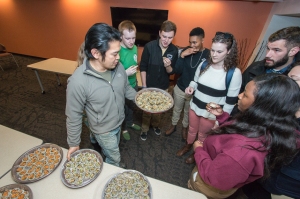Jess Pellegrino – General Assignment Reporter
Students were given education about sustainable living and ethical food sourcing—through the lenses of sushi.
The Sustainability Living Learning Community, through the Office of Residence Life, sponsored a “Sustainable Sushi” program in the Farnham Programming Space on March 11. The event was a collaboration with Miya’s Sushi of New Haven.
Rachel Krehel, freshman and pre-nursing major, came to the event for the free food, as well as to learn a thing or two.
“I was drawn in to the event because I love sushi, but when I found out what it was really about I became interested,” said Krehel. “My mother is responsible for buying the fish in my household, so I am curious to know their origins.”
said Krehel. “My mother is responsible for buying the fish in my household, so I am curious to know their origins.”
This was not Krehel’s first exposure to sustainable fish. Krehel said, “I go fishing in lakes and I eat the trout that I catch. I am a pre-nursing major so I live for all of this weird, gross stuff.”
Bun Lai, owner of Miya’s Sushi said it is the responsibility of the consumer to know where they are getting their food products from. Only the consumers can change the conversation about food.
“University students are the most influential people in society. I am going to have a discussion about how what we choose to consume and buy impacts literally everything in the entire world,” said Lai.
The program included various samplings of “sustainable” sushi, made from fresh, fair trade fish, produce and rice. One of the unconventional rolls was a sushi roll filled with crickets, apricots and cashew cheese.
 Lai said, “Tonight we are eating crickets, organically growth by a company called Aspire America. They are made for human consumption. They are nutritionally similar, but way healthier for you than factory raised livestock.”
Lai said, “Tonight we are eating crickets, organically growth by a company called Aspire America. They are made for human consumption. They are nutritionally similar, but way healthier for you than factory raised livestock.”
One of the most destructive foods a human can consume is beef, said Lai. It negativity affects not only a human’s body, but is also detrimental to the environment.
Beef is known to harden blood vessels, causes antibiotic resistance, and meat eaters risk getting meat-borne illness. It is even rumored to cause cancer.
Beef production also negativity affects the environment. Lai said, “It takes one and a half gallons of water to produce one pound of crickets. Fair trade off, right? It required 2,500 gallons of water to produce a single pound of beef.” In other words, beef production siphons into the water that humans need to survive.
Next on the menu was a shrimp based role. Lai dove into the dynamics of the shrimp market we see today.
“Almost all shrimp comes from abroad. When you partake in ‘all you can eat’ shrimp situations, you are basically endorsing slavery. In order for that shrimp to be so inexpensive, there is likely migrant workers slaving away on a boat somewhere, working for non-livable wages.”
 It is more expensive to purchase fair trade shrimp, but it is morally worth it, said Lai.
It is more expensive to purchase fair trade shrimp, but it is morally worth it, said Lai.
For those interested in finding out more about fairtrade and sustainable ingredients, Lai recommends looking at the Environmental Workers Group’s, or EWG, “Dirty Dozen” list.
This list looks at the produce in particular. It informs the shopper what produce items are the least sustainable and which produce items are sustainable.
Some of the least sustainable produce items are apples, grapes and peaches. Some of the most “clean” items include avocados, pineapples, cabbage and sweet corn.
Lai encourages students to ask questions and be conscious of the food they are eating, so that one day we can live in a more sustainable world.
Photo Credit: Derek Torrellas
Correction made March 25, 2015 at 12:45 p.m. A previous version incorrectly stated the program was sponsored by the Office of Sustainability.



























































































